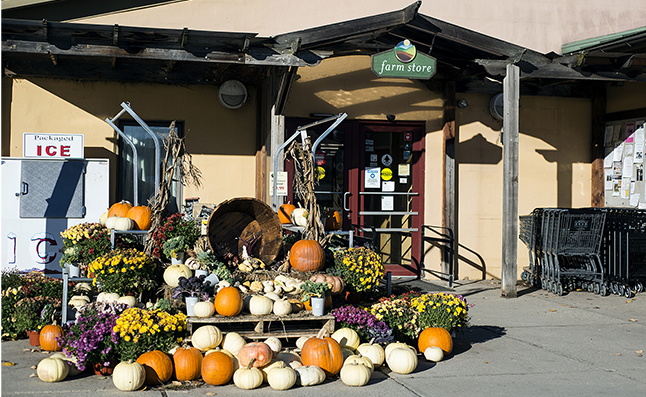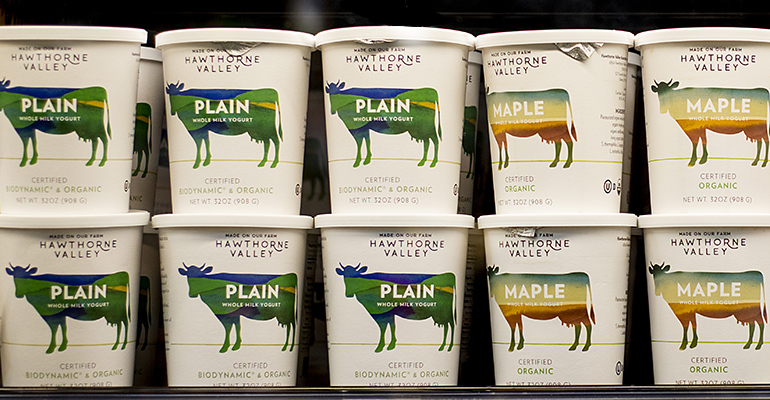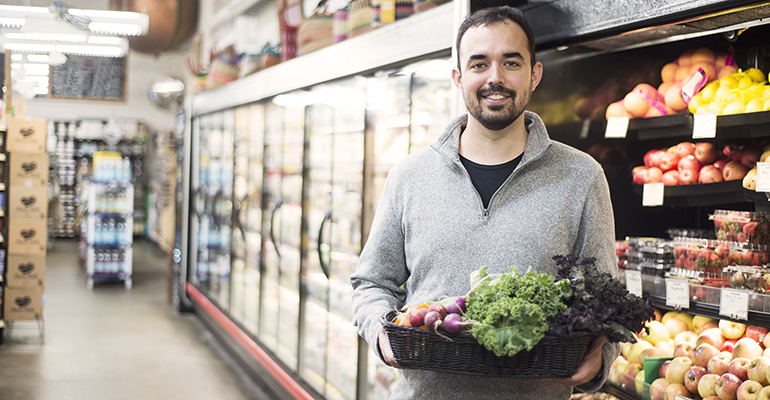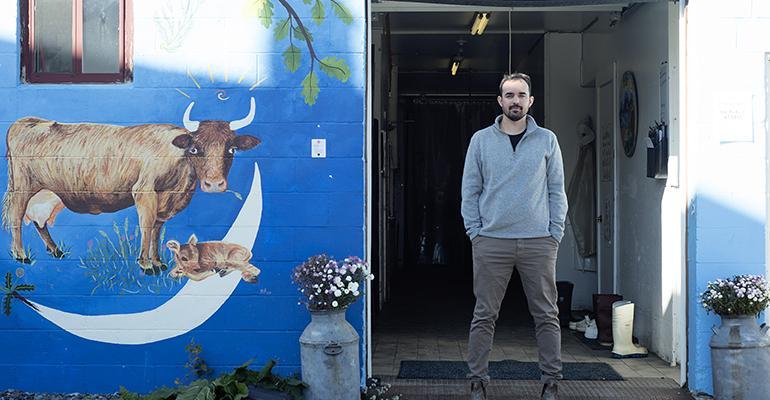Situated on a 900-acre biodynamic farm in upstate New York, Hawthorne Valley Farm Store is not your typical natural products store.
The full-line grocery, which started in 1972 as a humble farm stand with a shoebox for customers' money, is a key piece of the 51-year-old Hawthorne Valley Association. Founded in 1971, the nonprofit organization strives to reconnect people, place and purpose by integrating biodynamic agriculture, education and art. Today, it includes a K–12 Waldorf school, children's camps, farmer apprenticeships, a theater company and multiple social and ecological research initiatives—all supported by revenues from the store.
But Hawthorne Valley Farm Store is much more than just an economic engine for the association. Along with selling its own products crafted on-site, it also gives other local and regional producers a vibrant, well-trafficked place to market their yields. The store serves as a social and educational hub for the surrounding community while also drawing people from far and wide to this bucolic setting.

Hawthorne Valley Farm Store is situated on a 900-acre biodynamic farm in upstate New York.
Natural Foods Merchandiser, a division of New Hope Network and a sister brand of Supermarket News, recently caught up with Jeremy Laurange, director of retail, to learn more about this unique retail outlet and incredible organization.
How would you describe the store's role within the Hawthorne Valley Association?
Jeremy Laurange: We refer to the store as "the gateway to Hawthorne Valley." Because no matter what you're here for, whether you're touring the farm, visiting the school or coming to one of our many festivals, your journey is likely to start or end at our store. We sell vegetables grown on our farm, as well as yogurts and cheeses made in our creamery. Thankfully, because we're located on the farm, we can legally sell raw milk here.
The store is also the fiscal arm of the organization. Since we are a nonprofit, our goal is to accomplish our mission first and then just break even. Any profit the store generates goes to support our other programing.
Besides the items you make on-site, how do you determine which products to stock?
JL: We always give priority to local, biodynamic and organic products, kind of in that order. We also seek out clean products, so no chemicals or GMOs, and we look at SPINS for trends to make sure we are staying ahead of the curve. Overall, we try to create a unique selection that customers won't see elsewhere.

In addition to vegetables grown on its farm, Hawthorne Valley Farm sells yogurts and cheeses made in its creamery.
Many farmers follow organic practices but, because of various barriers, are not officially certified. Do you see this in your area?
JL: All the time. We live in an area that is blessed with a lot of local growers. Organic certification is expensive, and a lot of our local producers, though they follow all the practices, just can't afford it. We still want to support those growers. We have this as a defined category in our store, with little signs identifying producers who follow organic practices but are not certified.
Quite generously, you allow customers to order products directly through UNFI and Alberts Organics buying clubs. Why do this?
JL: We started this program about 20 years ago because we really wanted our customers to have access to great food at the best possible prices. Shopping this way allows them to buy larger quantities for less money. We process 30 to 40 orders a week—and they are not small orders. It works out better for us too because it takes far less human capital to make these transactions. It also keeps shoppers who want to buy in bulk from sweeping the shelves, and it helps us maintain shelf space for other products. Plus, when they pick up their buying club orders, they still come in to shop for other items.
What do customers love most about Hawthorne Valley Farm? What keeps them coming back?
JL: I'd like to say it's because we're awesome! No, since we're off the beaten path, we are definitely a destination-shopping experience. People come to us not only to do their grocery shopping. Maybe they want to spend a day on the farm and shop before they leave. Or maybe they stop in after dropping their kids off at our school. It also doesn't hurt that we have some of the best produce in the area and one of the best selections of organic products, including organic bakery items made fresh every single day.

"Since we're off the beaten path, we are definitely a destination-shopping experience," said Jeremy Laurange, retail director of Hawthorne Valley Farm. "People come to us not only to do their grocery shopping. Maybe they want to spend a day on the farm and shop before they leave."
What kinds of shoppers do you attract?
JL: We have three main customer demographics. The first is the local community from within about a 20-mile radius. We are fairly remote, so there is not much direct competition. Second, we have the parent community. Many come from a fair distance away to send their kids to school here, so we see our customer base shift when school starts each year. The third group is people from all over the Northeast. We get a lot of traffic from New York City, specifically, because people want to get out of the urban environment and into the country, and it's an easy train ride from the city to Hudson, which is about 15 minutes from our store.
How long have you been with Hawthorne Valley?
JL: I officially joined the store in 2002. I say "officially" because I grew up here. My mom has worked in the creamery for 25 years, and she'd bring me to work with her; I remember watching her make cheese and yogurt. When I graduated from high school, I started working here part-time. I continued that through college, then traveled for a while and came back to work periodically.
About 10 years ago, I took on a leadership role. I have literally worked every position at the store, and I feel that I can only be a leader if I understand and appreciate every single role. Now that I am director of retail, I feel like have a good understanding of what it takes to grow the business.
Early on, did you sense this might be your career someday?
JL: It started out as just a job, but as I grew into it, I became passionate. I realized I could make it into a career when I started attending food shows. My first Expo East was huge and amazing and such a different way of looking at food than how I viewed the food industry. I saw that it's not just about canned products on the shelf — it's about where food actually comes from. The inner workings behind the scenes matter incredibly to personal health and the environment. This was my "aha" moment that this was something I might really enjoy long-term.
This article originally appeared on New Hope Network, a Supermarket News sister website.






